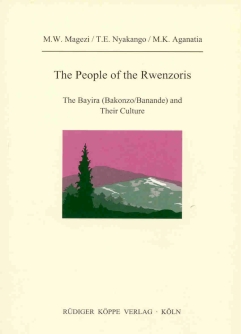
The People of the Rwenzoris
The Bayira (Bakonzo/Banande) and Their Culture
Author: M.K. Aganatia, M.W. Magezi, T.E. Nyakango. Series edited by: Heike Behrend.
Series: AWB Africans write back Volume 2
2004111 pp.
Text language(s): English
Format: 145 x 210 mm
160 g
Paperback
€ 29.80
Buy 'The People of the Rwenzoris' as a downloadable PDF document directly from our online shop »
Order 'The People of the Rwenzoris' as print edition »
The Bayira, a Bantu speaking people, populates parts of Eastern Democratic Republic of Congo and Western Uganda. The larger part of the population (approximately 5 millions) lives on the Congolesian side and is known under the name Banande, whereas only appr. 700,000 people of this ethnic group live in the Rwenzori mountains in Uganda, where they are called the Bakonzo.
The society of the Bayira in the Rwenzori area possesses a certain ethnographic tradition which roots in Isaya Mukirania’s field studies in the nineteen fifties. In the course of time, the intense occupation with the Bayira’s cultural and historical heritage lead to strong political tendencies. In opposition to the hegemony of the kingdom of Tooro, Mukirinia and others fought for cultural and political autonomy. Although his writings were burned during the turmoil of the violent conflicts that followed independence, their contents are still present in the collective consciousness of the people.
The present work offers information that was collected in many different ways and therefore presents different aspects of Bayira culture, religion and history. Beside the classic field study methods – like the interview – the authors also made use of modern media und started an appeal to the public via radio and TV to participate in discussions about these subjects. Therefore, this study allows an insight into a complex and collectively shared knowledge, rather than the mere documentation of a single author’s knowledge. As a result, the project turned into an original experiment of ethnographic study.
The last chapter of the book gives detailed insight into the history of the Rwenzori Movement, a separatist movement which started a war against the adjacent kingdom of Tooro and the central government of Uganda in the nineteen sixties. As a result of this War of Secession, the Rwenzori mountains developed into an area of retreat for the members of the movement, which lead to the proclamation of the Rwenzori kingdom. The ethnological and historical working of the revolution has not attracted much attention up to now and therefore the book offers a wealth of new experiences and insights, and gives the impulse to start new studies.
Under these links you will find further descriptions of Ugandan languages and cultures:
Accompanying material:
- A Linguistic Bibliography of Uganda
(ISBN 978-3-89645-180-4 ) - A Modern Runyoro-Rutooro Grammar (J.10)
(ISBN 978-3-89645-023-4 ) - Erwachsenenbildung in Äthiopien und Uganda
(ISBN 978-3-89645-684-7 ) - Naaho Nubo – The Ways of Our Ancestors
(ISBN 978-3-89645-420-1 )
Cross-reference:
- Ik Dictionary
(ISBN 978-3-89645-133-0 ) - Kasus im Ik
(ISBN 978-3-89645-135-4 ) - Sustainability in Karamoja?
(ISBN 978-3-89645-256-6 )
| « back | Print version | [top] |
 Books
Books Audio
Audio Biographies
Biographies Series
Series Festschrifts
Festschrifts Journals
Journals